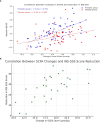Effects of short-chain fatty acid-producing probiotic metabolites on symptom relief and intestinal barrier function in patients with irritable bowel syndrome: a double-blind, randomized controlled trial
- PMID: 40575487
- PMCID: PMC12198239
- DOI: 10.3389/fcimb.2025.1616066
Effects of short-chain fatty acid-producing probiotic metabolites on symptom relief and intestinal barrier function in patients with irritable bowel syndrome: a double-blind, randomized controlled trial
Abstract
Background: IBS often appears as bloating, altered bowel patterns, and abdominal pain (AP).Probiotics and SCFA may be useful in mucosal repair and symptom relief, according to earlier research, however there is currently a lack of systematic evidence supporting their therapeutic effectiveness across a variety of IBS subtypes.
Objective: To investigate the impacts of probiotics on signs and intestinal barrier function (IBF) in individuals with multiple IBS subtypes, and evaluate the role of SCFA in this process.
Methods: A double-blind randomized controlled trial (DBRCT) design was adopted. Using the Rome IV criteria, a total of 120 individuals with IBS were randomised to either the probiotic group (PG) or placebo group (PLG). The intervention lasted for 12 weeks with an additional 4-week follow-up. In addition to fecal SCFA (FSCFA) levels, intestinal permeability (L/M ratio), tight junction proteins (TJP), serum/fecal inflammatory markers, and adverse event occurrence, the primary endpoint (PEP) evaluated was IBS Symptom Severity Scale (IBS-SSS) scores. Subgroup analysis was performed in selected cases.
Results: In terms of symptom scores, there was a major correlation among group and time (F=9.314, P<0.001), and repeated-measures ANOVA showed that the PG's scores were considerably < than those of the control group (CG) beginning in week 8 (all P<0.01). Levels of acetate, propionate, and butyrate considerably increased after 12 weeks of intervention (all P<0.01). Intestinal permeability and Occludin significantly improved at weeks 8 and 12 (all P<0.0167), while important differences in Claudin-1 and Zonulin appeared only at week 12 (all P<0.0167). Inflammatory markers considerably decreased at week 12 (all P<0.0167). There were no statistically significant differences in adherence or adverse events (P>0.05). Reductions in symptom scores were positively connected with an increase in SCFAs (r=0.43, P=0.002). Subgroup analysis across multiple IBS subtypes indicated significant symptom relief at week 12 for all subtypes (all P<0.05).
Conclusion: Probiotics significantly improved clinical symptoms in IBS patients of different subtypes by increasing short-chain fatty acid levels, repairing the intestinal barrier, and reducing inflammation.
Keywords: Intestinal barrier function (IBF); Irritable bowel syndrome (IBS); Probiotics; Short-chain fatty acids (SCFA); double-blind randomized controlled trial (DBRCT).
Copyright © 2025 Li, Wang, Guo and Zhang.
Conflict of interest statement
The authors declare that the research was conducted in the absence of any commercial or financial relationships that could be construed as a potential conflict of interest.
Figures
References
-
- Abdel-Samie O. A. M., ElGindy E. M., Fawzy I. M., Saad H. I. (2021). Evaluation of the use of probiotics in patients with irritable bowel syndrome. QJM: Int. J. Med. 114, hcab107–011. doi: 10.1093/qjmed/hcab107.011 - DOI
Publication types
MeSH terms
Substances
LinkOut - more resources
Full Text Sources
Miscellaneous



